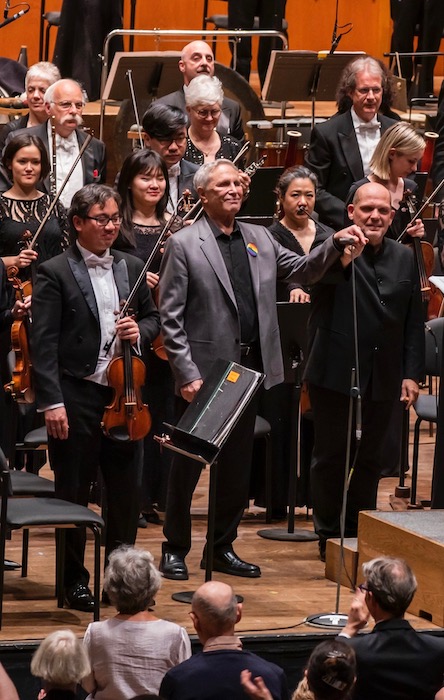Corligiano masterwork emerges with fresh emotional impact from van Zweden, Philharmonic

John Corigliano and Jaap van Zweden acknowledge applause following the New York Philharmonic’s performance of Corigliano’s Symphony No. 1 Thursday night at David Geffen Hall. Photo: Chris Lee
All three works on the New York Philharmonic’s Thursday night concert are steeped in tragedy, or at least melancholy. The two-hour deep dive into pathos might have been overwhelming, if only they had all been delivered at the same level. In the end, the classics faltered while a modern masterwork stood out for its rich emotional power.
Opening with Brahms’s Tragic Overture, the Philharmonic was remarkably crisp in its playing, if a little thin. Yet despite the shapely phrases crafted by music director Jaap van Zweden, the performance lacked energy—the hushed dotted rhythms, which ought to crackle with suspense, sounded merely tired.
Mozart’s Piano Concerto No. 24 in C minor felt similarly lax, but more to the point, it was sloppy. Throughout the first movement, soloist David Fray rushed constantly over the edge of the beat, tripping his fingers over each other and muddying his passagework. Though still lacking energy, the full orchestra played with more clarity as a group than the soloist on his own.
The Larghetto was at least clearer, though Fray’s clunky touch marred his phrasing, and the whole felt overly straight: even just the slightest touch of rubato would have helped the music feel more expressive. Fray and the orchestra together found more focus in the closing Allegretto, yet still there was a feeling that everyone was simply going through the motions rather than investing much energy in the concerto.
While the warhorses failed to register, a forceful reading of John Corigliano’s Symphony No. 1 redeemed the entire program.
The composer, hale at 81, gave an introduction from the stage, walking the audience through the piece and sharing memories of the friends who inspired it, all victims of the AIDS epidemic in the 1980s.
The first movement bears the title “Apologue: Of Rage and Remembrance,” and indeed it is a harrowing start to an intense work, opening with a deafening explosion of fury that continues to seethe quietly as it subsides. There is a sense of ordered chaos in Corigliano’s writing, as he creates emotional turmoil without allowing the music to lose its focus. A tangle of fragmented outbursts coming from various corners of the orchestra is always anchored by some constant element, such as the icy melody of the violins under frenzied murmuring in the horns.
The second movement, drawing on a tarantella Corigliano wrote for a friend, has an almost supernatural quality in its opening tableau, an ethereal mixture of high strings, woodwinds, and gentle chimes. As the movement progresses, we hear a fierce struggle to find clarity as the tarantella theme breaks down, reflecting the progress of AIDS dementia in one of Corigliano’s departed friends. The specificity with which van Zweden led the orchestra ensured the trajectory of the music was never lost, even in its dizzying race to confusion in the final bars.
In his opening remarks, Corigliano himself allowed that the piece can be read as a tragic symphony even without the knowledge of its precise significance. Yet the final movement, “Giulio’s Song,” is so powerfully connected to its inspiration that its symbolic meaning feels essential. The mournful melody of the solo cello, taken from an improvisation that Corigliano played with one of his college classmates, really does seem to evoke a departed spirit, especially so once various other solo instruments—horn, oboe, flute—enter with their own distinctive voices, each representing another AIDS victim.
As they did throughout the symphony, the Philharmonic played brilliantly here, investing their solos with deep feeling that set up the fury of the conclusion. Even if their argument for more traditional concert staples was lacking, this moving performance of Corigliano’s symphony made clear that it deserves to enjoy its own place as a vital masterwork of the twentieth century.
The program will be repeated 8 p.m. Saturday at David Geffen Hall. nyphil.org






